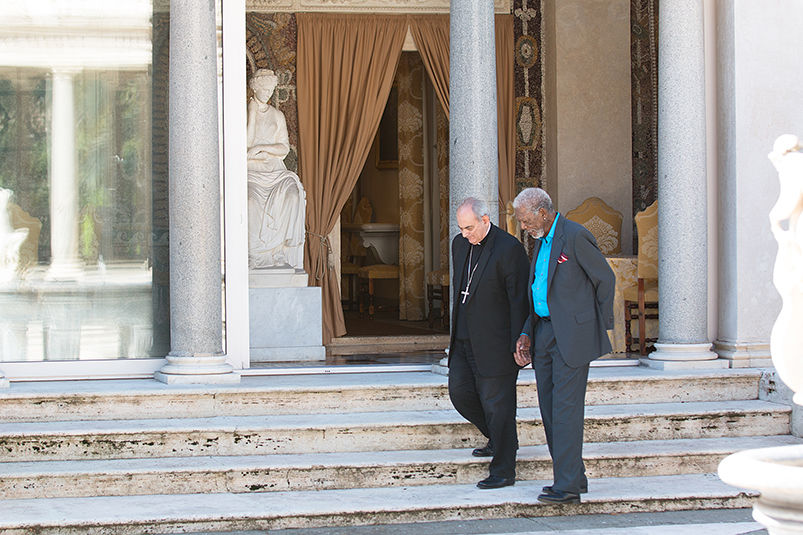“The Story of God,” a six-episode documentary series on how humanity considers the divine, premieres Sunday, April 3, on the National Geographic Channel. Actor Morgan Freeman, who has voiced the Almighty in a few movies, is host and narrator, along with being an executive producer for Revelations Entertainment, with Lori McCreary and James Younger.
The series sends Freeman around the world on a quest to see how certain religions — primarily Judaism, Hinduism, Buddhism, Christianity, and Islam — deal with the larger questions of life. The six episodes are “Beyond Death” (April 3), “Apocalypse” (April 10), “Creation” (April 17) — which are the three sent out to the press — “Who Is God?” (April 24), “Evil” (May 1) and “Miracles” (May 8).
In the three episodes provided (which are not final air versions), Freeman goes to clergy and/or believers to talk about every faith except Christianity, which gets discussed primarily by academics in the first two episodes. There’s not a sense that the show is anti-Christian — Freeman appears to be a former Christian with more universalist or pantheistic leanings now — but there is a distinguishable effort to give all the faiths discussed equal consideration (with maybe a soft spot toward Islam, without entirely shying away from its problems).
Freeman seems most personally engaged when he’s talking about Buddhism, particularly when he responds to a Christian couple’s tale of using faith to endure Hurricane Katrina by comparing their belief to Buddhism (which the couple ignores, plowing on to talk about Jesus). Discussions of Christian doctrine are essentially accurate, but those involving professors lack the warmth evident when someone is relating their own deeply held beliefs.
But, according to press materials, a later episode involves a visit to Joel Osteen’s megachurch, so there’s that.
In episode one, on the afterlife and the fear of death, Freeman speaks of Christianity, saying: “For Christians, Jesus’ blood sacrifice was the last that needed to be made. From then onward, all you had to sacrifice for eternal life were your selfish desires. In this way, the death of Jesus was transformed, for Christians, into the ultimate victory over death.”
Then he skips straight to India, to talk about how Hinduism uses reincarnation to overcome the fear of death.
Catholic clergy don’t appear until episode three, “Creation,” when Freeman journeys to Rome to talk to Msgr. Marcelo Sanchez Sorondo, chancellor of the Pontifical Academy of Sciences — and Freeman is very surprised to hear that it was founded in 1603, under first president Galileo.
Freeman also talks to a priest/astronomer from the Vatican observatory. In both cases, the Church avers its welcoming attitude toward science and discusses how the cosmological Big Bang theory blends into the larger theological view of creation. This appears to confound Freeman, who then emphasizes how a snippet of the Islamic creation myth, and that of the Aboriginal people of Australia, also resemble the Big Bang … though it’s a bit of a stretch in both cases.
But, Freeman does end the Creation episode with “as it was in the beginning, is now, and ever shall be, world without end” — omitting all specific theological references, and the “Amen,” and not mentioning that the “Glory Be” is a Catholic prayer.
Ultimately, the project has a universalist goal, to show how all religions are more alike than different. At a press event in January, McCreary — who says she believes in God — remarked: “In America, there’s a lot of talk about God and our differences. Maybe this [series] will be something that would help us enlighten each other about how similar we are and that we come from similar roots.”
She added, “Maybe that will help us understand each other and maybe reach a hand across a table that we might not otherwise do.”

